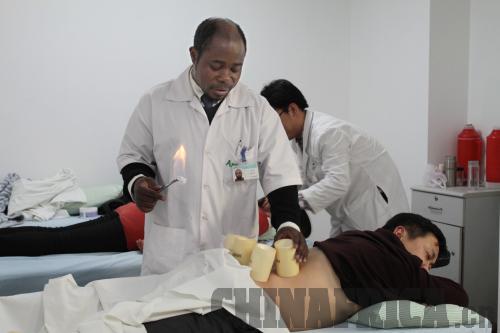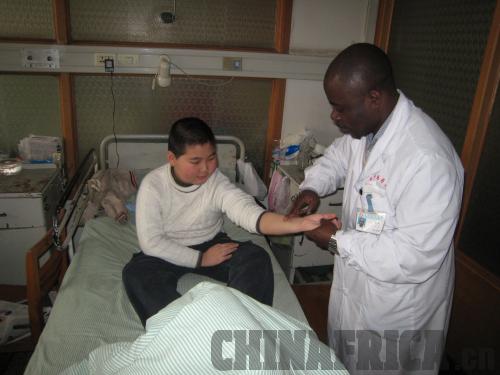|
 |
|
Dr. Ovono Nkomo uses cupping to treat a patient (COURTESY PHOTO) |
For 35-year-old Gabonese doctor Ovono Nkomo, traditional Chinese medicine (TCM) seemed like magic to him before he came to the Middle Kingdom. But after studying TCM for 12 years and working as a doctor in China, he describes TCM as a science.
Born in a doctor family in Bitam, a town in north Gabon, Nkomo was inspired by his family since he was a child, and he always dreamed of becoming a doctor. While around 10 of his family members are Western medicine doctors, he said he is proud to be the first in his family who learned both Chinese and Western medicine.
The hard way
Before Nkomo decided to study TCM at Nanjing University of Chinese Medicine (NJUCM) in 2005, he had already spent four years studying Western medicine at Ruijin Hospital, affiliated with Shanghai Second Medical University, currently known as the School of Medicine of Shanghai Jiao Tong University. He remembered how he changed his mind to study TCM.
"When I was in Gabon, I saw Chinese people do acupuncture. I was just thinking it was magic and only Chinese people can do it, and that it was passed from older generations in the family," he recalled.
"While in China, I saw doctors in hospitals using acupuncture, cupping, massage, herbs to treat patients and the results were good," he said, adding that it was from this time on that he had another view of Chinese medicine.
However, learning TCM is not easy. The first obstacle for Nkomo was the language. Although he spent nine months learning Chinese when he first arrived in China, the medical terms of TCM, which are difficult even for Chinese students, posed a great challenge for him initially.
Whenever he came across a TCM term that was difficult to understand, he looked it up in the dictionary. He found out its meaning in French or English, and then wrote it down in his notebook. Many notebooks piled on his desk have kept track of his hard work over the years.
His next obstacle was reading the classics of TCM, such as The Yellow Emperor's Classic of Internal Medicine and Treatise on Febrile and Miscellaneous Disease. "Studying TCM theories are as equally important as practices," he stressed. As some of these classics have not yet been translated well, he had to read them in the original classical Chinese characters. But his hard work finally paid off. After a while, his classical Chinese was even better than that of many Chinese students.
 |
|
Dr. Ovono Nkomo examines a young patient (COURTESY PHOTO) |
The value of TCM
In Nkomo's view, differential diagnosis is the biggest difference between TCM and Western medicine. "For instance, when you have a headache, Western medicine doctors will just treat the headache, while the TCM doctor will consider all aspects, and treat the whole body instead of only focusing on the headache," he said.
Compared to Western medicine, he feels that TCM tries to find "friends" within the human body, and stimulates the patient's own upright qi, energy that prevents external pathogenic invasions from entering the body. In contrast, the goal of Western medicine is to find "enemies" and kill bacteria or viruses by using chemicals. "TCM combines many kinds of herbs to exert greater effect and regulates the body's internal environment, [helping it to] regain its balance," he said.
"Western medicine is superficial, as it only addresses symptoms but not root causes, while TCM resolves problems deeply," he added.
Nkomo's research area is in the pediatric practice of TCM. He felt that children are more delicate, and sometimes their diseases are more complicated than those of adults. Besides, they cannot express themselves so well and it is not easy to get to know their conditions through emotions. "More importantly, TCM is natural and safe, without side effects, so it's more suitable for children. The process may be long, but it can always affect a radical cure," he concluded.
|